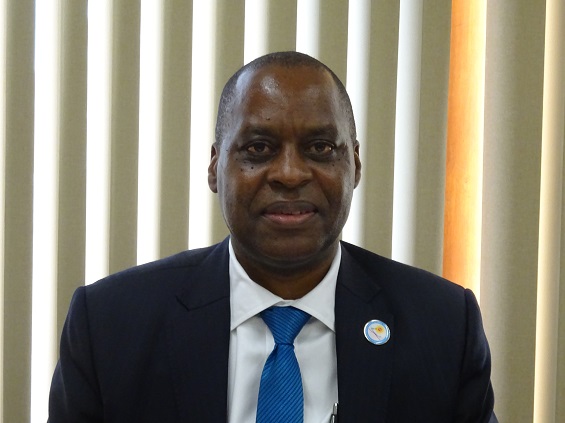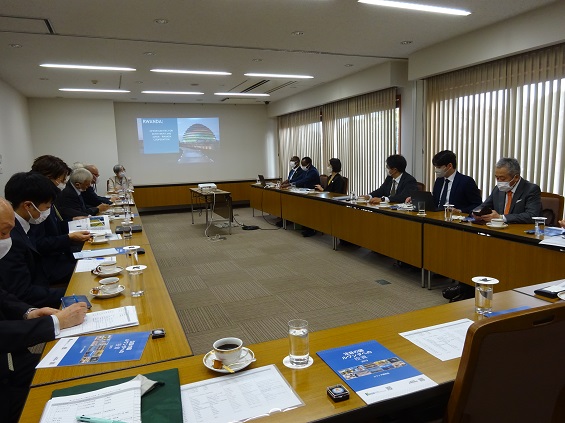
第11回在京大使との懇談会開催

- アーネスト・ルワムキョ在京ルワンダ大使との懇談会
-
11th Country―Study Meeting with His Excellency Mr. E. RWAMUCYO, Ambassador of the Republic of Rwanda to Japan
The Society held its 11th Country-Study meeting on 22th November at the International House in Tokyo, with the presence of H.E. Mr. E.Rwamucyo, Ambassador of the Republic of Rwanda to Japan. (Number of attendants: 20 persons)
The ambassador made his presentation as follows:
Rwanda has had a good relationship with Japan, and this month President Kagame met Prime Minister of Japan Mr Kishida held bilateral talks in Indonesia、taking the opportunity of Mr. Kishida’s visit to Indonesia to attend the G20 Heads of States Conference.Rwanda’s per capita GNI reached 870 U.S dollars recently, and it has become the second fastest growing economy in Africa. It has made efforts for the improvement of the welfare of the people and has tried to change the structure of its economy from the agriculture-led one to the service-and industry oriented one, aiming at achieving growth with less risk in a business-friendly environment. Rwanda is a member of the East African Community, COMESA and the Commonwealth. It has simplified the procedures to start business in the country. It also tries to ease measures such as simplifying business procedures, welcoming foreigners to start up business or to invest in the country. In the field of education, the Government has promoted higher education in the country and now about 30 per cent of the population do speak languages spoken in the western nations. 70 percent of its population is under 30 years of age.
In the field of business, efforts to promote start-up, link up and technological innovation have been made. As a result of its efforts for structural change of its economy, now 28% of its population are in the agricultural sector, while 17 % are in the industry and 48% are in the service sector.
The bilateral relationship between Rwanda and Japan dates back to the 1960s and it is well known that Mr. Masaya Hattori served in Rwanda as the Governor of the Central Bank of Rwanda from 1965 to 1971 and consolidated the foundation of its national financial management. Youths from Japan came to Rwanda under the scheme of JOCV, and many of them contributed to different aspects of welfare and livelihood, for example development of sports, agriculture and teaching in the country. Japan’s bilateral assistance to Rwanda was extended to many fields of development such as water resource development, nutrition, fundamental education, agricultural development, electric power development and other areas. Japan has also assisted Rwanda in the fields of health, including measures to contain COVID19. Apart from such bilateral efforts, Japan’s assistance to Rwanda through multilateral organizations has also been done, and the two countries have already built productive and strategic partnership.
The questions and comments raised by the participants from member companies are as follows;
(1) What was the voting attitude of Rwanda at the U.N.General Assembly when the debate for the adoption of the resolution on Russia’s military attack on Ukraine was done?
(2) Has Rwanda’s situation of food supply been badly affected by the recent situation in Ukraine, since it has so far imported food from Ukraine?
(3) In order to solve such a question of irregular supply of food and other goods related to agriculture, promotion of regional trade seems to be more enhanced. What is the view of your Excellency on this matter?
(4) The security situation in the western regions in the Democratic Republic of Congo has been unstable, and this seems to have given Rwanda undesirable effects. What is the position of Rwanda against the situation?
(5) Rwanda so far has achieved development in the fields of agriculture, industry and other areas utilizing data analysis and is still aiming at more development through IT development. What have been the major reasons for Rwanda to decide to choose such a way of development?―アーネスト・ルワムキョ在京ルワンダ大使との懇談会―
第11回「在京大使との懇談会」
―E.ルワムキョ在京ルワンダ大使との懇談会―11月22日午後、国際文化会館会議室において、アーネスト・ルワムキョ駐日ルワンダ大使をお迎えして、同国の政治経済発展の近況について伺う会を開催しました(会員企業等からの出席者20名)。
先ずルワムキョ大使より、同国は日本と良好な関係を有しており、11月14日、G20首脳会合出席のためインドネシアを訪問中の岸田総理と、カガメ大統領は2国間関係について会談を行ったところである、同国の近年の経済成長の結果、本年度の1人当たり国内総生産(GDP)は870米ドルに達しており、アフリカにおける2番目に速く成長している経済であり、国民の福祉向上にも努めている、農業型経済からサービス・工業型経済への構造的経済転換を進めているところであり、成長、少ないリスク、ビジネスフレンドリーであることなどを目指している、また同国は国際市場及びアフリカ市場に参入しており、EAC自由貿易協定、COMESAにも加盟している一方、英連邦にも属している。国内でビジネスを開始するための登録は簡易化されており、この他投資環境の改善策として、ビジネス・フレンドリーな各施策、インセンティブの供与、プロセスの能率化、外国からの参入の歓迎、などを行っている、教育にも力を入れており、国民の30%が西側の言語を理解する、人口の70%が30歳以下であり、経済の変革にも努めており現在では農業従事者が約28%、工業が17%、サービス業が48%となっている。
また、ルワンダと日本との関係は1960年代まで遡ることができ、JICAにより派遣された服部正也氏が1965年から1971年までルワンダ中央銀行総裁として活躍し、同国財政の基礎を築いたことは有名であるが、その後受け入れを開始したJOCV隊員は様々な福祉分野に尽力し、特にスポーツ普及、教育、農業などの面で貢献した。日本の協力は水資源開発、栄養、基礎教育、農業開発、電力、また最近ではCOVID‐19対策などにも及んでいる。このような二国間協力にとどまらず、国際機関を通じる協力も日本はルワンダに対し行っており、両国は生産的戦略的なパートナーシップを築いていると言えよう、と説明しました。
次いで出席者から、(1)ルワンダはロシアによるウクライナ侵略に関する累次の国連決議採択において、どのような立場をとったのか?(2)ルワンダはこれまでウクライナから穀物などを多く輸入してきたが、そのため現在食物の不足や価格の高騰などの悪い影響を受けているのではないか?(3)このような問題を解決するために、アフリカ諸国間の貿易がより振興されるべきと思われるが、どのようになっているのか?(4)コンゴ民(DRC)東部の不安定な状況がルワンダにマイナスの影響を与えているのではないか?(5)ルワンダは農業、工業、その他の面でデータ分析を基礎とし、IT立国を目指しているが、このチャレンジを遂行する肝要な要素は何か?などの質問が出されました。

主催イベント
- 第5回大使を囲む会懇親会開催
- 第6回大使を囲む会懇親会開催
- 「アフリカの文化と芸術を知る」シリーズ 第6回講演会
- 「アフリカの文化と芸術を知る」シリーズ 第5回講演会
- アフリカ協会主催 2025年第2回シンポジウム
- 2025年10月10日 第11回オンライン・アフリカ講座を開催しました。
- 2025年7月31日「アフリカの感染症を知る」シリーズ 第15回講演会を開催しました。
- 「アフリカの文化と芸術を知る」シリーズ 第4回講演会
- 学術研究会 第13回研究発表会
- 学術研究会 第12回研究発表会
- 第4回大使を囲む会懇親会開催
- 第3回大使を囲む会懇親会開催
- 第2回大使を囲む会懇親会開催
- 第1回大使を囲む会懇親会開催
- 2025年4月17日「アフリカの感染症を知る」シリーズ 第14回講演会を開催しました。
- 「アフリカの文化と芸術を知る」シリーズ 第3回講演会
- 学術研究会 第11回研究発表会
- 2025年2月7日JICA安井民間連携事業部長との懇談会を開催しました。
- 2025年1月30日「アフリカの感染症を知る」シリーズ 第13回講演会を開催しました。
- 2024年12月17日
- 第10回大使を囲む懇談会
- 2024年11月14日
- 第9回大使を囲む懇談会開催
- 2024年5月1日 第9回オンライン・アフリカ講座を開催しました。
- 学術研究会 第10回研究発表会
- 2024年10月17日「アフリカの感染症を知る」シリーズ 第12回講演会を開催しました。
- JOGMECとの懇談会開催
- 第8回大使を囲む会懇親会開催
- 第7回大使を囲む会懇親会開催
- 学術研究会 第9回研究発表会
- 第5回大使を囲む懇談会開催
- 第4回大使を囲む懇談会開催
- 第6回大使を囲む懇談会開催
- 2024年7月4日「アフリカの感染症を知る」シリーズ 第11回講演会を開催しました。
- 第3回大使を囲む懇談会開催
- 第2回大使を囲む懇談会を開催
- 学術研究会 第8回研究発表会
- 2024年5月1日 第8回オンライン・アフリカを開催しました。
- 「アフリカの文化と芸術を知る」シリーズ 第1回講演会
- 2024年4月18日「アフリカの感染症を知る」シリーズ第10回講演会を開催しました。
- 第1回大使を囲む懇談会を開催
- 第11回大使を囲む懇談会を開催
- 第8回世界一愉しいアフリカ講座を開催
- 第10回大使を囲む懇談会を開催
- 2023年1月25日「アフリカの感染症を知る」シリーズ 第9回講演会を開催しました。
- 第12回在京大使との懇談会を開催しました。
- 2023年7月6日「アフリカの感染症を知る」シリーズ第8回講演会を開催しました。
- 2023年10月26日 オンライン・アフリカ講座第7回を開催しました。
- 第9回大使を囲む懇談会を開催
- 第8回大使を囲む懇談会を開催
- 2023年8月3日学術研究会 第7回研究発表会を開催しました。
- 第6回大使を囲む懇談会開催
- 第7回大使を囲む懇談会開催
- 2023年7月13日 オンライン・アフリカ講座第6回を開催しました。
- 2023年7月6日「アフリカの感染症を知る」シリーズ第7回講演会を開催しました。
- 2023年6月23日第5回大使を囲む懇談会を開催しました。
- 2023年5月25日第4回大使を囲む懇談会を開催しました。
- 2023年5月19日第3回大使を囲む懇談会を開催しました。
- 2023年4月26日第2回大使を囲む懇談会を開催しました。
- 2023年4月11日第1回大使を囲む懇談会を開催しました。
- 2023年5月10日学術研究会 第6回研究発表会を開催しました。
- 2023年4月20日「アフリカの感染症を知る」シリーズ第6回講演会を開催しました。
- 2023年3月14日野口英世アフリカ賞受賞者講演会を開催しました。
- 2023年3月24日第14回大使を囲む懇談会を開催しました。
- 2023年3月9日第13回大使を囲む懇談会を開催しました。
- 2023年3月2日第12回大使を囲む懇談会を開催しました。
- 2023年3月29日 オンライン・アフリカ講座第5回を開催しました。
- チャレンジ企画第8弾!「オンライン対談シリーズ “Proudly from Africa 〜 アフリカのロールモデルの話を聞く” 」
- 2023年2月24日学術研究会 第5回研究発表会を開催しました。
- 2023年1月19日「アフリカの感染症を知る」シリーズ第5回講演会を開催しました。
- 第11回在京大使との懇談会を開催しました。
- モーリタニア・イスラム共和国投資促進セミナーを開催しました。
- チャレンジ企画第7弾!「オンライン対談シリーズ “Proudly from Africa 〜 アフリカのロールモデルの話を聞く” 」
- 2022年11月10日学術研究会 第4回研究発表会を開催しました。
- 2022年10月28日 オンライン・アフリカ講座第4回を開催しました。
- 2022年10月14日「アフリカの感染症を知る」シリーズ第4回講演会を開催しました。
- 2022年9月13日第11回大使を囲む懇談会を開催しました。
- 2022年8月9日第10回大使を囲む懇談会を開催しました。
- 2022年8月5日第9回大使を囲む懇談会を開催しました。
- 2022年7月26日第8回大使を囲む懇談会を開催しました。
- 2022年7月21日第7回大使を囲む懇談会を開催しました。
- 2022年7月8日第6回大使を囲む懇談会を開催しました。
- 2022年8月2日学術研究会 第3回研究発表会を開催しました。
- 2022年7月14日「アフリカの感染症を知る」シリーズ第3回講演会を開催しました。
- 2022年7月15日 オンライン・アフリカ講座第3回を開催しました。
- 2022年6月17日第5回大使を囲む懇談会を開催しました。
- 第10回在京大使との懇談会を開催しました。
- 2022年6月14日第4回大使を囲む懇談会を開催しました。
- 2022年6月2日第3回大使を囲む懇談会を開催しました。
- チャレンジ企画第6弾!「オンライン対談シリーズ “Proudly from Africa 〜 アフリカのロールモデルの話を聞く” 」
- 2022年4月28日学術研究会 第2回研究発表会を開催しました。
- 2022年4月19日「アフリカの感染症を知る」シリーズ第2回講演会を開催しました。
- 2022年3月25日 オンライン・アフリカ講座第2回を開催しました。
- 2022年5月31日第2回大使を囲む懇談会を開催しました。
- 2022年4月15日第1回大使を囲む懇談会を開催しました。
- 2022年2月15日第16回大使を囲む懇談会を開催しました。
- 2022年1月27日「アフリカの感染症を知る」シリーズ第1回講演会を開催しました。
- 2022年2月4日第15回大使を囲む懇談会を開催しました。
- 2022年1月25日第14回大使を囲む懇談会を開催しました。
- 2021年11月26日 オンライン・アフリカ講座第1回を開催しました。
- 2021年11月9日第13回大使を囲む懇談会を開催しました。
- 2021年11月5日第12回大使を囲む懇談会を開催しました。
- 2021年10月26日2021年度学術研究会 第1回研究発表会を開催しました。
- 2021年10月6日第11回大使を囲む懇談会を開催しました。
- 2021年8月27日第10回大使を囲む懇談会を開催しました。
- 2021年8月17日第9回大使を囲む懇談会を開催しました。
- 2021年8月26日
- チャレンジ企画第三弾!「オンライン対談シリーズ 分断を乗り越えて〜My Blood Divides and Unites〜」
- 2021年7月7日第8回大使を囲む懇談会を開催しました。
- 2021年7月2日第7回大使を囲む懇談会を開催しました。
- 2021年6月30日第6回大使を囲む懇談会を開催しました。
- 2021年6月2日第5回大使を囲む懇談会を開催しました。
- 2021年5月27日
- 2021年5月27日第4回大使を囲む懇談会を開催しました。
- 2021年6月24日
- チャレンジ企画第二弾! 「オンライン対談シリーズ “Proudly from Africa 〜 アフリカのロールモデルの話を聞く” 」
- 2021年4月28日
- 2021年4月28日第3回大使を囲む懇談会を開催しました。
- 2021年5月6日
- チャレンジ企画 「オンライン対談シリーズ “Proudly from Africa 〜 アフリカのロールモデルの話を聞く” 」
- 2021年4月21日
- 2021年4月21日第2回大使を囲む懇談会を開催しました。
- 2021年4月14日
- 2021年4月14日第1回大使を囲む懇談会を開催しました。
- 2021年3月16日
- 2021年3月16日「アフリカ協会創立60周年記念シンポジウム」を開催しました。
- 2020年12月22日
- 2020年12月22日第2回大使を囲む懇談会を開催しました。
- 2020年12月7日
- 第9回在京大使との懇談会を開催しました。
- 2020年10月16日第1回大使を囲む懇談会を開催しました。
- 2020年3月3日第13回大使を囲む懇談会を開催しました。
- 第8回在京大使との懇談会を開催しました。
- 2020年1月15日
- 2020年1月15日第12回大使を囲む懇談会を開催しました。
- 第11回フォーラム「TICAD 7 の成果とこれからの官民連携について」
- 2019年12月24日
- 2019年12月24日第11回大使を囲む懇談会を開催しました。
- 2019年10月16日
- 2019年10月16日第10回大使を囲む懇談会を開催しました。
- 2019年10月2日第9回大使を囲む懇談会を開催しました。
- 2019年9月19日
- 第7回在京大使との懇談会を開催しました。
- 2019年6月24日
- 第10回フォーラム「TICAD 7 官民連携のあり方と進化について」
- 第6回在京大使との懇談会を開催しました。
- 2019年9月29日
- 「第7回世界一愉しいアフリカ講座」
- 2019年7月17日第8回大使を囲む懇談会を開催しました。
- 2019年7月3日
- 2019年7月3日第7回大使を囲む懇談会を開催しました。
- 2019.7.1
- 2019年7月1日第6回大使を囲む懇談会を開催しました。
- 2019.615
- 2019年6月15日第7回『アフリカから学ぶー文化編』を開催しました。
- 2019.5.31
- 2019年5月31日第5回大使を囲む懇談会を開催しました。
- 2019年5月7日
- 2019年5月7日第4回大使を囲む懇談会を開催しました。
- 2019年4月23日
- 2019年4月23日第3回大使を囲む懇談会を開催しました。
- 2019年4月17日
- 2019年4月17日第2回大使を囲む懇談会を開催しました。
- 2019年4月1日
- 2019年4月1日第1回大使を囲む懇談会を開催しました。
- 2019年3月12日第14回大使を囲む懇談会を開催しました。
- 2019年2月21日第13回大使を囲む懇談会を開催しました。
- 2019年2月13日第12回大使を囲む懇談会を開催しました。
- 2019年2月5日第11回大使を囲む懇談会を開催しました。
- 2019年1月25日第10回大使を囲む懇談会を開催しました。
- 2019年1月16日
- 2019年1月16日第9回大使を囲む懇談会を開催しました。
- 2019年1月10日
- 2018年1月10日第8回大使を囲む懇談会を開催しました。
- 2018年12月8日第6回『アフリカから学ぶー映画編』を開催しました。
- 第5回在京大使との懇談会を開催しました。
- 2018年10月23日
- 2018年10月23日 合田真 日本植物燃料株式会社 代表取締役 講演会を開催しました。
- 2018年9月29日
- 第5回世界一愉しいアフリカ講座を開催しました。
- 2018年8月6日
- 第9回フォーラム「アフリカにおける金融と産業振興」議事録(抄録)
- 2018年8月22日
- 第4回在京大使との懇談会を開催しました。
- 第9回フォーラム
- 2018年7月25日
- 2018年7月25日第7回大使を囲む懇談会を開催しました。
- 2018年7月14日
- 2018年7月14日第5回『アフリカから学ぶー映画編』を開催しました。
- 2018年6月22日
- 2018年6月22日第6回大使を囲む懇談会を開催しました。
- 2018年6月1日
- 2018年6月1日第5回大使を囲む懇談会を開催しました。
- 2018年5月23日
- 2018年5月23日第4回大使を囲む懇談会を開催しました。
- 第8回フォーラム「アフリカにおける中国の動向と日本」
- 2018年5月10日
- 2018年5月10日第3回大使を囲む懇談会を開催しました。
- 2018年4月24日
- 2018年4月24日第2回大使を囲む懇談会を開催しました。
- 2018年4月9日
- 2018年4月9日第1回大使を囲む懇談会を開催しました。
- 2018年3月29日
- 平成29年度大使レセプション報告
- 2018年3月23日
- 2018年3月23日池亀美枝子AU-NEPADアフリカ連合開発機構総裁特別顧問講演会を開催しました。
- 2018年2月2日
- 2018年2月2日第14回大使を囲む懇談会を開催しました。
- 2018年1月26日
- 2018年1月26日第13回大使を囲む懇談会を開催しました。
- 2017年12月9日
- 2017年12月9日第4回『アフリカから学ぶー社会・文化編』を開催しました。
- 2017年11月24日
- 2017年11月24日第12回大使を囲む懇談会を開催しました。
- 2017年11月1日
- 2017年11月1日第11回大使を囲む懇談会を開催しました。
- 2017年10月25日
- 2017年10月25日第10回大使を囲む懇談会を開催しました。
- 2017年10月13日
- 第3回在京大使との懇談会を開催しました。
- 2017年6月5日
- 第7回フォーラム「地域シリーズ第3回・南部アフリカー域内流通と産業振興ー」
- 2017年8月1日
- 2017年第1回牧野前JICAガーナ所長を囲む懇談会開催
- 2017年7月20日
- 2017年7月20日第9回大使を囲む懇談会を開催しました。
- 2017年5月16日
- 2017年5月16日 第2回在京大使との懇談会を開催しました。
- 2017年6月28日
- 2017年6月28日第8回大使を囲む懇談会を開催しました。
- 2017年6月15日
- 2017年6月15日第7回大使を囲む懇談会を開催しました。
- 2017年6月13日
- 2017年6月13日第6回大使を囲む懇談会を開催しました。
- 2017年5月31日
- 2017年5月31日第5回大使を囲む懇談会を開催しました。
- 2017年5月25日
- 2017年5月25日第4回大使を囲む懇談会を開催しました。
- 2017年5月19日
- 2017年5月19日第3回大使を囲む懇談会を開催しました。
- 2017年4月25日第2回大使を囲む懇談会を開催しました。
- 2017年4月12日
- 2017年4月12日第1回大使を囲む懇談会を開催しました。
- 2017年3月14日
- 2017年3月14日第17回大使を囲む懇談会を開催しました。
- 2017年3月9日
- 2017年3月9日第16回大使を囲む懇談会を開催しました。
- 2017年2月15日
- 2017年2月15日 第15回大使を囲む懇談会を開催しました。
- 2017年1月18日
- 2017年1月18日 第14回大使を囲む懇談会を開催しました。
- 2017年1月17日
- 2017年1月17日 第1回在京大使との懇談会を開催しました。
- 2017年1月11日
- 2017年1月11日 第13回大使を囲む懇談会を開催しました。
- 2016年12月20日
- パソナグループ南部代表 表敬訪問
- 2016年12月12日
- 服部禮次郎アフリカ基金 2016年度助成授与式及び感謝の盾贈呈
- 2016年10月18日
- 第6回フォーラム「TICAD VI 報告―民間セクターによる事業投資と人材育成」
- 2016年11月30日
- 平成28年度大使レセプション報告
- 2016年11月8日
- 2016年11月8日第12回大使を囲む懇談会を開催しました。
- 2016年11月7日
- 2016年11月7日第11回大使を囲む懇談会を開催しました。
- 2016年10月25日
- 2016年10月25日第10回大使を囲む懇談会を開催しました。
- 2016年10月4日
- 2016年10月4日第9回大使を囲む懇談会を開催しました。
- 2016年7月20日
- 7月20日岸田外務大臣を表敬のうえTICAD Ⅵに向けた政策提言を提出
- 第5回フォーラム 「TICAD VI ビジネスと人材育成-日本らしい視点で」
- 2016年7月5日
- 2016年7月5日第8回大使を囲む懇談会を開催しました。
- 2016年6月22日
- 2016年6月22日第7回大使を囲む懇談会を開催しました。
- 2016年5月13日
- 2016年5月13日第6回大使を囲む懇談会を開催しました。
- 2016年4月27日
- 第5回大使を囲む懇談会を開催しました。
- 2016年4月21日
- 第4回大使を囲む懇談会を開催しました。
- 2016年4月18日
- 第3回大使を囲む懇談会を開催しました。
- 2016年4月12日
- 第2回大使を囲む懇談会を開催しました。
- 2016年4月5日
- 第1回大使を囲む懇談会を開催しました。
- 2016年2月1日
- 2016年2月1日第13回大使を囲む懇談会を開催しました。
- 2016年1月19日
- 2016年1月19日第12回大使を囲む懇談会を開催しました。
- 2015年12月21日
- 2015年12月21日第11回大使を囲む懇談会を開催しました。
- 2015年12月17日
- 2015年12月17日第10回大使を囲む懇談会を開催しました。
- 2015年12月10日
- 2015年12月10日第9回大使を囲む懇談会を開催しました。
- 2015年11月24日
- 第2回江口前JICAケニア所長を囲む懇談会開催
- 2015年11月20日
- 第8回大使を囲む懇談会開催
- 2015年10月22日
- 第7回大使を囲む懇談会開催
- 2015年10月19日
- 第2回山田前ジェトロ・アビジャン所長を囲む懇談会
- 2015年10月1日
- 第6回大使を囲む懇談会開催
- 2015年9月28日
- 鈴木裕之国士舘大学教授講演会 開催
- 2015年7月29日
- 平成27年大使レセプション報告
- 2015年7月9日
- 第4回フォーラム 「地域シリーズ第2回・西部アフリカ-西アフリカも面白い-」
- 2015年7月6日
- 第5回大使を囲む懇談会開催
- 2015年6月16日
- 第4回大使を囲む懇談会開催
- 2015年5月29日
- 第3回大使を囲む懇談会開催
- 2015年5月26日
- 第2回大使を囲む懇談会開催
- 2015年5月19日
- 第1回佐藤ジェトロ・ラゴス事務所長を囲む懇談会開催
- 2015年5月15日
- 第1回大西前JICAタンザニア所長を囲む懇談会開催
- 2015年4月28日
- 2015年度第1回大使を囲む懇談会開催
- 2015年3月24日
- 第14回大使を囲む懇談会開催
- 2015年2月10日
- 第13回大使を囲む懇談会開催
- 2015年1月15日
- 進藤奈邦子WHOメディカルオフィサー講演会開催
- 2014年12月17日
- 第12回大使を囲む懇談会開催
- 2014年12月2日
- 特別セミナー エボラ出血熱治療研究の最前線
- 第3回フォーラム
2014年11月25日 - 「地域シリーズ第1回・東部アフリカ―消費財を通じて豊かな生活の実現へ」
- 2014年11月13日
- 第11回大使を囲む懇談会開催
- 2014年10月30日
- 第10回大使を囲む懇談会開催
- 2014年10月17日
- 第9回大使を囲む懇談会開催
- 2014年9月22日
- 第8回大使を囲む懇談会開催
- 2014年9月1日
- 第7回大使を囲む懇談会開催
- 2014年8月4日
- 第6回大使を囲む懇談会開催
- 2014年5月27日
- 安倍昭恵総理夫人講演会開催
- 2014年6月11日
- 平成26年度 アフリカ大使レセプション報告
- 2014年5月23日
- 第4回大使を囲む懇談会開催
- 2014年5月16日
- 第5回大使を囲む懇談会開催
- 2014年4月23日
- 第3回大使を囲む懇談会開催
- 2014年4月14日
- 第2回大使を囲む懇談会開催
- 2014年3月27日
- 第1回大使を囲む懇談会開催
- 2014年2月12日
- 安倍首相のアフリカ訪問に関する報告会・討論会 議事録
- アフリカ協会・日仏会館共催シンポジウム
2013年10月18日 - 「第5回アフリカ開発会議は何を残したか?-アフリカの挑戦と日本の挑戦」
- 第2回フォーラム
2013年4月12日 - 「アフリカの民間セクターと ビジネスチャンス」
- 第1回フォーラム
2012年11月26日 - 「TICAD Vと民間連携」




